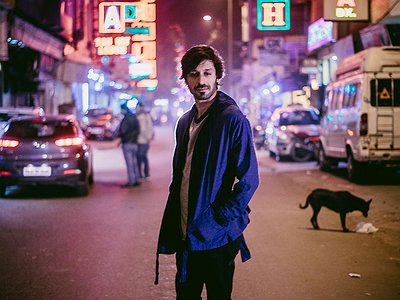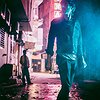Part 2
Collaborations can take on many forms. What role do they play in your approach and what are your preferred ways of engaging with other creatives through, for example, file sharing, jamming or just talking about ideas?
All of my collaborations have happened with artists whose ideas and autonomy I respect very much - I prefer to let them do what feels natural to them, and I do the same. Because we’re bouncing ideas off each other, really interesting things end up happening that would never have happened if we were working solo. I mostly prefer working on collaborations in person - when all of us are in the same room, playing our instruments and hearing each other experiment in real-time. A number of times I’ve heard my collaborator play something in passing that was absolutely brilliant, and they didn’t even notice it, and vice versa. I don’t think we always have the most fair and unbiased view of our own creativity, so it’s great to have someone who can point out what catches their ear.
Could you take us through a day in your life, from a possible morning routine through to your work? Do you have a fixed schedule? How do music and other aspects of your life feed back into each other - do you separate them or instead try to make them blend seamlessly?
I have two kinds of days in my life - touring or at home. When I’m touring, I’m usually up early to catch a flight, after which we do a sound check, catch a bit of rest in the hotel, followed by the gig and repeat. When I’m at home, I usually sleep by midnight, wake up early the next morning, spend a few hours in the studio, go to the gym, work a bit more in the evening and then call it a day.
It’s interesting that you asked about how music blends into the rest of my life - for years, I was 100% all about the music and didn’t really have much of a life beyond that, to be honest. But that didn’t turn out so well for me, as I ended up isolating myself and missing out on a lot of what life has to offer. So now I draw some lines to also allow my personal life to grow, to spend time with family and friends, and to give myself a break when I need it. This actually helps the creative process and makes me more productive.
Could you describe your creative process on the basis of a piece or album that's particularly dear to you, please? Where did the ideas come from, how were they transformed in your mind, what did you start with and how do you refine these beginnings into the finished work of art?
I just released “Life Forms”, which was a really deep and at times challenging journey from start to finish. My ideas usually start out as melodies, or a sequence of chords. That’s the essence of the song, for me. An early version of Life Forms had a completely different beat, and was 6 bpm slower, but the groove wasn’t feeling quite right, so I stripped out everything except for the melodies and rebuilt the song from scratch. This happened 4 times, and the final version is the one on the release.
Even though the melodic content of the song is already in place, there’s still a lot to figure out - should textures be organic or digital, which piece of gear to use for each part, and so on. In the end, it’s the finer details that make the music feel finished. I’m perfectly fine with making a shitty first draft of a good idea, as I know that the rest of the process is about making the idea work through trial and error.
There are many descriptions of the ideal state of mind for being creative. What is it like for you? What supports this ideal state of mind and what are distractions? Are there strategies to enter into this state more easily?
I’m still searching for the answer to this question - as far as I’ve discovered, I can be really creative in all kinds of states. For example, I love writing music when I’m feeling grounded, well rested and at peace. But I will also sometimes feel a strong urge to write music when I’m feeling troubled, angry, sad or scared. The latter is a much more turbulent experience, but those emotions are also part of being human, so it’s all welcome. The biggest distraction, however, that has no positive qualities is social media. It’s tempting to have a quick scroll through one’s Instagram feed while taking a break in the studio, but I find that it removes me from my own headspace and makes it hard for me to get back into the same mindset. Now I keep my phone at a physical distance while writing music. There isn’t any one way to get into the creative mindset more easily, but a few rules and rituals can be really helpful.
How is playing live and writing music in the studio connected? What do you achieve and draw from each experience personally? How do you see the relationship between improvisation and composition in this regard?
I’ve found that the kind of gigs I’m playing definitely has an impact on what I produce in the studio. I really enjoy making music that is uninhibited and fun to play live. I also end up occasionally producing something that’s a lot quieter and more ambient, but those are usually reserved for my LPs.
I find it really useful to get back from a weekend of touring and compose the track I wish I’d had over the weekend, after which I'll try out my works in progress at gigs to see how the crowd responds.
How do you see the relationship between the 'sound' aspects of music and the 'composition' aspects? How do you work with sound and timbre to meet certain production ideas and in which way can certain sounds already take on compositional qualities?
The interplay between composition (or the “note”) and sound (or “timbre”) is an essential part of production for me. It’s extremely important to choose the right sound for your elements, as the same pattern could sound like any number of genres depending upon the timbre. I think the timbres I end up using are a major part of my sound as an artist. They’re like two sides of the same coin, and it’s necessary to get both right when you’re writing a song.
Our sense of hearing shares intriguing connections to other senses. From your experience, what are some of the most inspiring overlaps between different senses - and what do they tell us about the way our senses work? What happens to sound at its outermost borders?
I do find the overlap between our various sense fascinating. When people ask my where I get my inspiration from, I usually say “from everything”, because in my experience, anything can filter through into a new musical idea. It’s possible to translate any of the senses - visuals, touch, smell or taste into music, and that’s where a lot of my ideas come from.
Art can be a purpose in its own right, but it can also directly feed back into everyday life, take on a social and political role and lead to more engagement. Can you describe your approach to art and being an artist?
Art can have so many forms, and it’s also so intensely personal for whoever is making it. Art is similar to language in that way - it can be used for anything. For me, it’s a means of communication and connection with myself. When I create something from scratch, I feel like I’m in a conversation with an ancient, mystical and intangible part of myself. Hearing an idea in my head and then transcribing it into audible form is like receiving a gift from an otherworldly source. It’s a sublime, self-contained experience that helps me make sense of life and the world around me.
It is remarkable, in a way, that we have arrived in the 21st century with the basic concept of music still intact. Do you have a vision of music, an idea of what music could be beyond its current form?
The ways in which we make and consume music has changed so much over the millennia, but it’s still the same felt and heard experience as it was at the dawn of civilisation. I’ve been fascinated by the way music is such a universal experience for people throughout history and all over the world. I think it’s a part of being human - just like the way we need and respond to love, food and connection.
As of 2019, music has diversified into hundreds of thousands of genres, the rapid evolution of which has been facilitated by technology and the internet. It’s local one day, and global the next. I think as long as human civilisation exists, people will continue to build upon our collective musical legacy by taking old ideas and evolving them to create something new. And it’ll continue to be enjoyed by people on a collective and individual the same way it always has been.






